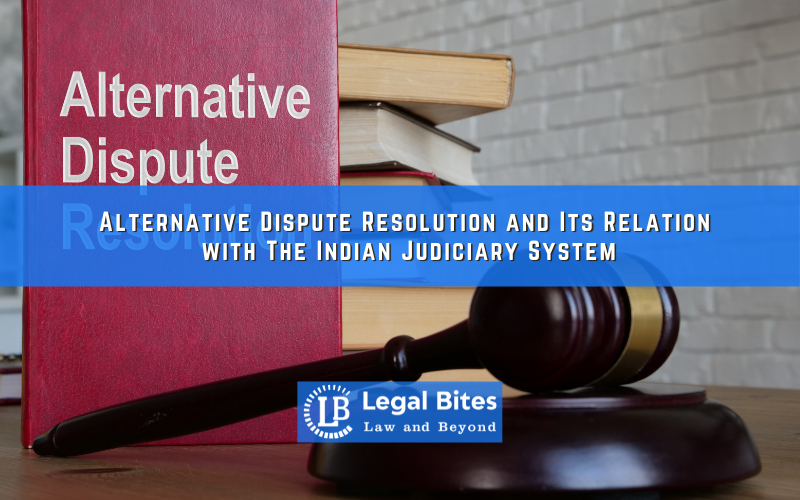Alternative Dispute Resolution and Its Relation with The Indian Judicial System
This article by Nandani Singhania talks about alternative dispute resolution and its relation to the Indian judicial system. Introduction The Judiciary system has been loaded with lots of cases. For the judiciary system, to serve justice to the parties within a reasonable period of time as it is an allegiance of the efficacious judicial system, ADR acts as… Read More »

This article by Nandani Singhania talks about alternative dispute resolution and its relation to the Indian judicial system.
Introduction
The Judiciary system has been loaded with lots of cases. For the judiciary system, to serve justice to the parties within a reasonable period of time as it is an allegiance of the efficacious judicial system, ADR acts as a huge supporting system for the people as well as for the courts, as now courts can give their utmost time to the case litigants with actual disputes that cannot be settled without the interference of law or mutual understanding. The idea of ADR has given significant value to time and money as it renders justice without any delay.
Procrastination, a burning issue faced and talked about in our legal system has now been overcome by ADR. It has acted as a dual supporter, it has acted as a boon for the people as it saves time and money and within the time the disputed matter is resolved, it acts as a helping hand of the court, by taking the case burden of the court, and reducing the no. of cases that can be mutually settled and by reducing the no, of cases in the court it has also given a push to the important cases.
Description
ADR basically helps in settling disputes outside the court with the help of a third party. Disputes like – partnership, civil matters, construction projects, insurance time-barred debts. ADR also acts as a boon for the people of the country who in case of any dispute don’t want the other party to get punished or get dragged into the court but just settle the dispute and sort things out. ADR is, in the lucid account is a method of resolving disputes between the parties outside the court, unlike litigation.
Litigation is a legal procedure of solving the dispute in a civil court of law, It is a quasi-judicial body, which is bound to glean facts and make a verbal movement that comforts the mind of both parties.
ADR can be considered as the easy road taken by people who themselves fail to come to a conclusion and do not want to go through a process of litigation which in their knowledge is considered time and money consuming, it is a dispute solved between the two parties by the neutral third party only with the consent of both the parties.
It is basically employed by the people of insurance companies, establishments, who have disputes in the field of contracts and claims. It is sometimes a predetermined mindset between the people who come into a contracting state a clause in their contract that in case of dispute in future or during the execution of the contract, they would consider ADR to solve the dispute, in case any.
ADR in India
Provision of arbitration, conciliation, judicial settlement, and mediation is mentioned in Section 89 of CPC.
It says that if a court thinks that element of settlement is present between the parties or a compromise can be made on the basis of a settlement, the court would basically lay down certain terms and conditions before the parties and ask for their own separate observance on the same if they want any modification or say amendment in the terms and conditions laid down to them, after receiving the observances of both the parties, they can ask for the same, the court according to their every observance, lay down new and final terms and conditions then refer and submit it to the arbitration, conciliation or judicial settlement mediation.
Section 89(2) says that the provision that shall apply if the matter has been submitted for arbitration and conciliation would be the arbitration and conciliation act 1996 and if the matter has been sent to the Lok Adalat the provisions of the Legal Service Authority Act, 1987 shall apply to dispose of the matter Section 89 was added in the CPC through an amendment in 1999, it was basically recommended by the law commission of India and the Malimath committee report.
Order connected
Order 10 – examination of parties by the court (rule 1 to 4)
10(A)– Direction of the court to opt for any one mode of ADR
Section-89 as well as order 10 rules 1-A to 1-C.
Reference
- Section 89, Code of Civil Procedure, 1908
- Legal Service Authority Act, 1987
- Malimath committee report
- Gauravprakashp, Section 89 of CPC- A Critical Analysis, Available Here


